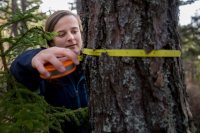
As our world is rapidly warming, the field of environmental careers is rapidly expanding.
As a result, Bates environmental studies majors have their choice of ways to tackle environmental problems — a whole world of professional opportunities to explore.
In January, six Bates alumni who work in the environmental field returned to campus to share their experiences and advice with current students. Here are some takeaways that are sustainable both for environmental work and for the Bates students pursuing it.
Pick a problem; pick a passion
The panelists agreed that whether it’s food waste, water infrastructure, or environmental justice, the sooner you find an issue you’re passionate about, the better.
“Start to think really critically about what problem you want to solve,” said Emma Conover ‘16, who works on water issues for Ceres, a nonprofit that helps companies become more sustainable. “Maybe it’s super specific, maybe it’s general, but just try to think about what that issue is, and start to think through how that could translate into a job.”
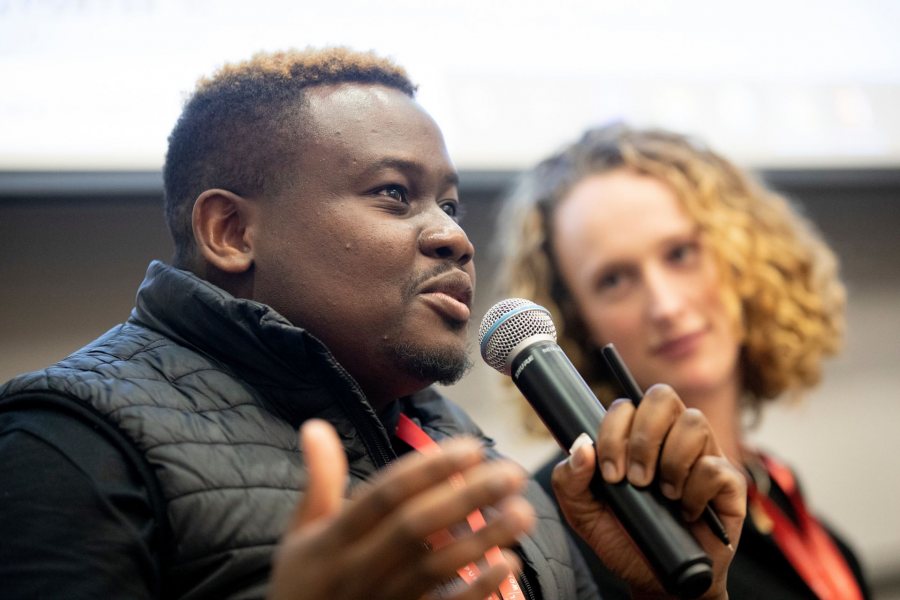
Phil Dube ’16, a graduate student at Yale, speaks at a panel on environmental careers, sponsored in January by the Center for Purposeful Work. (Phyllis Graber Jensen/Bates College)
This kind of focus can help an environmental studies graduate stand out in the field, said Phil Dube ‘16, who is pursuing a master’s of environmental management at the Yale School of Forestry and Environmental Studies.
“If you’re in a position where you can do something that’s unique and it’s in line with your interests, I highly recommend you take advantage of those opportunities,” he said.
Networking is key
Once you find an issue you’re passionate about, it’s important to start building connections around it, said Conover.
“Have conversations with alumni, have conversations with your friends, people you know, and just strengthen those relationships, so when a job comes up, you already have those relationships,” she said.
The alumni advised using platforms like LinkedIn to manage professional networks and stay up to date on the latest issues impacting a particular field.
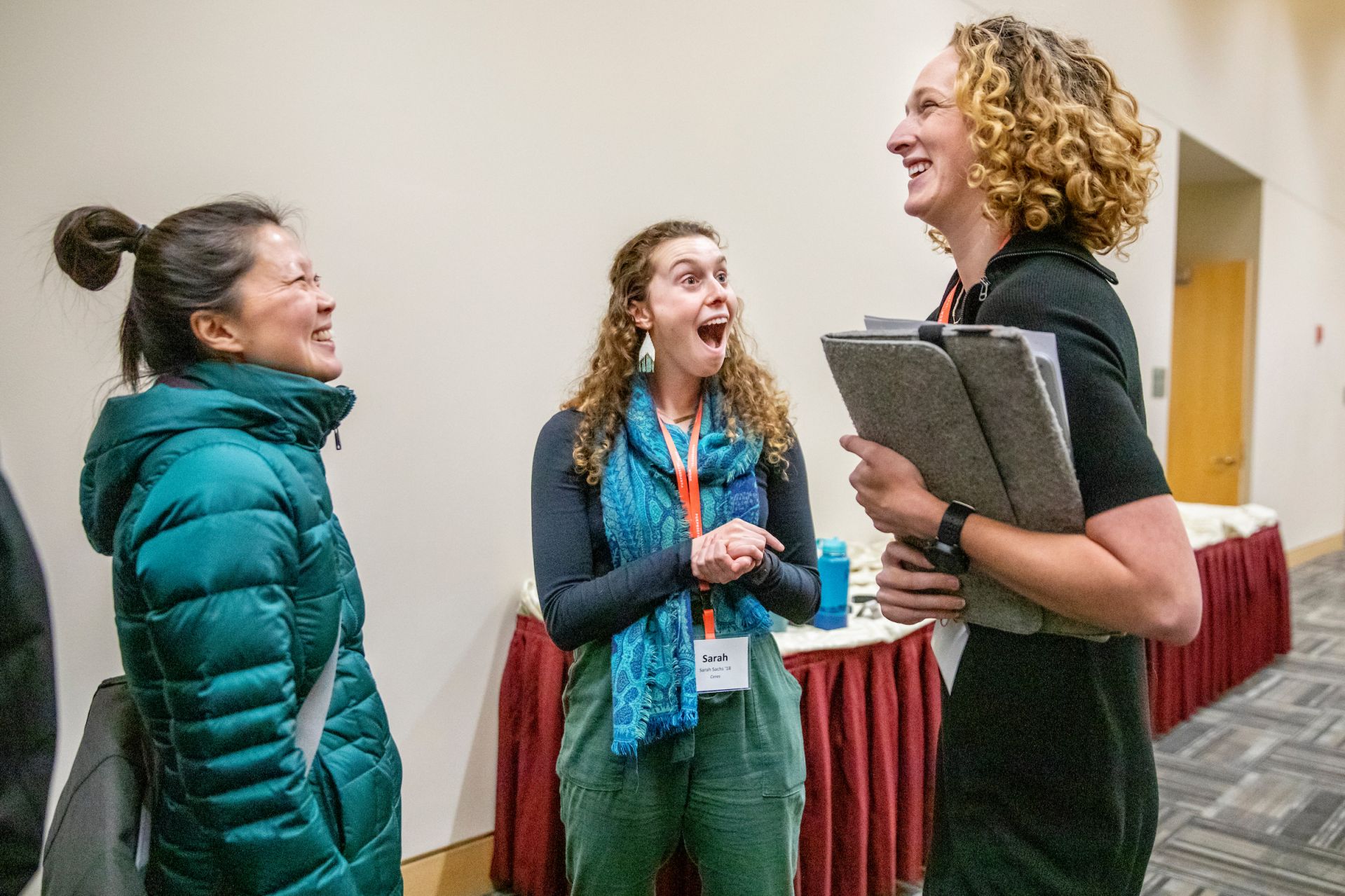
At a January gathering of Bates alumni in environmental careers and students interested in those careers, Emma Conover ’16, right, shares a laugh with fellow Ceres employee Sarah Sachs ’18, center, and Hoi Ning Ngai, an associate director at the Center for Purposeful Work. (Phyllis Graber Jensen/Bates College)
“It’s really great for job searching, internships, finding people in a field you might be interested in, and staying up to date on news,” Conover said.
In fact, all six panelists stressed the importance of networking, offering personal examples of how their connections got them to where they are today. They told students not to fear reaching out to someone and starting a conversation — you never know what kind of opportunities it could lead to.
Pop the bubble
Though it may seem counterintuitive, one of the most meaningful experiences while at Bates is actually getting outside of Bates.
Lucy Brennan Perkins ‘14, the sustainability program coordinator for the city of South Portland, Maine, said it’s important to talk to people who are different from you and immerse yourself in the local communities.
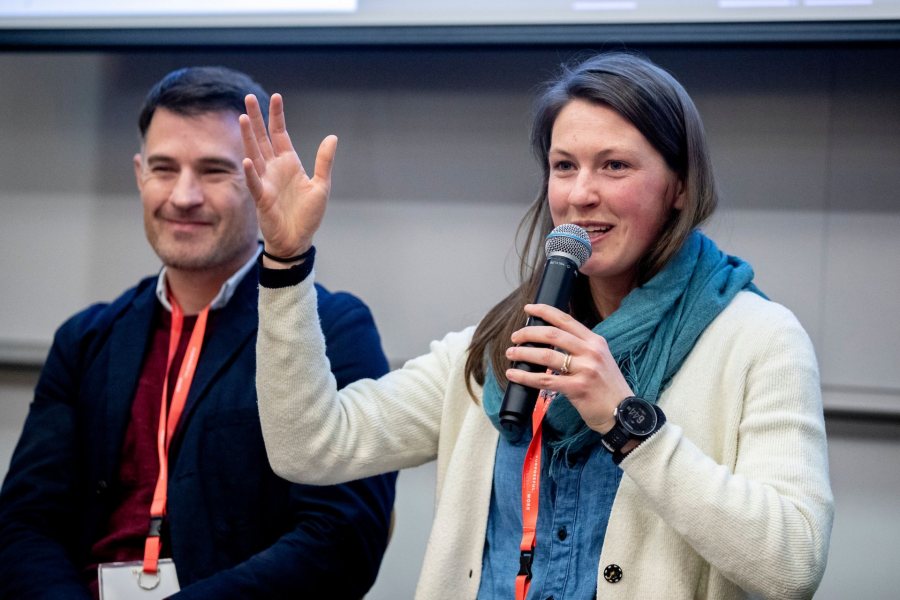
Lucy Brennan Perkins ’14 speaks about her work in South Portland’s sustainability office at a January gathering of Bates students and alumni. (Phyllis Graber Jensen/Bates College)
“Working out in the community is so valuable,” said Perkins, who spent a summer working for Lots to Gardens, a program of the St. Mary’s Nutrition Center that turns vacant lots in Lewiston into urban gardens. “I gained such an appreciation for Lewiston that I did not have before as a student in the Bates bubble. Do your best to get outside and work across your differences.”
Get international
Climate change is a global problem, so environmental work often requires a global perspective.
“Going into grad school, I was one of the most well-traveled internationally,” Dube said. “And this becomes a big advantage especially when working with climate change, a global issue.”
In addition to spending time in the local Lewiston community, it’s important to get experiences beyond Maine and beyond the U.S. as a whole.
“Go on those Short Term trips,” Dube added, explaining that spending a semester abroad or taking a Short Term with a travel component can help one’s understanding of climate change as a global issue and how it impacts communities around the world.
Write, write, write
Sure, some of us can’t wait to stop writing essays when we get out of Bates, but don’t underestimate the power of the written word. The writing skills that Bates nurtures are something you’ll carry the rest of your life, said Jeffrey Porter ’85, an environmental lawyer and chair of Boston Harbor Now, which works to sustainably develop Boston’s waterfront.
“The ability to write and express yourself in writing and orally, and organize your thoughts and be persuasive, that’s really what matters,” Porter said.
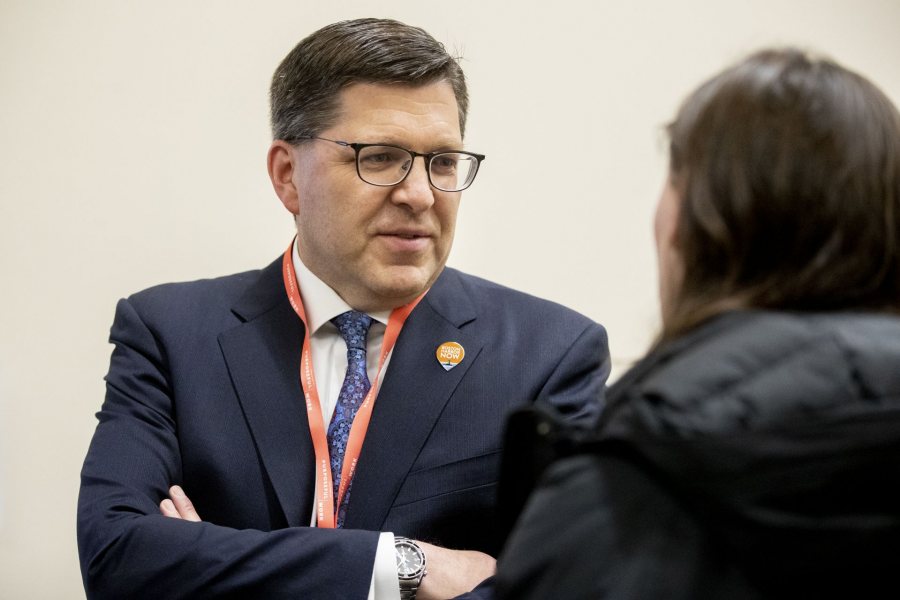
Environmental lawyer Jeffrey Porter ’85 speaks with Bates students and fellow alumni at a January gathering to help environmental studies students network and get career advice. (Phyllis Graber Jensen/Bates College)
Mike Lydon ‘04 said his writing skills helped him launch his urban planning business, Street Plans, in 2009. In 2011 Lydon published a short pamphlet based on observations from an urbanist blog he ran. He wasn’t expecting it to reach many people, but said, “I posted it online and in a few months there were like 10,000 downloads.”
“It was the writing that really helped me take my passions, my angle, my lines of inquiry, and my questions and express them in a way that was very clear to people,” said Lydon, who is an internationally recognized writer as well as an urban planner and advocate for livable cities.
The panelists agreed that publishing articles, pamphlets or short updates on your work can help you expand your platform and allow the issues you care about to reach a wider audience.
Anticipate future issues
The environment is changing, and our approaches to climate change are changing along with it. It’s important to keep tabs on emerging issues, said Dube. How, for example, will we continue to get water to Los Angeles in the decades to come? How will general water usage, green infrastructure, and the management of chemical contaminants shift in tomorrow’s world?
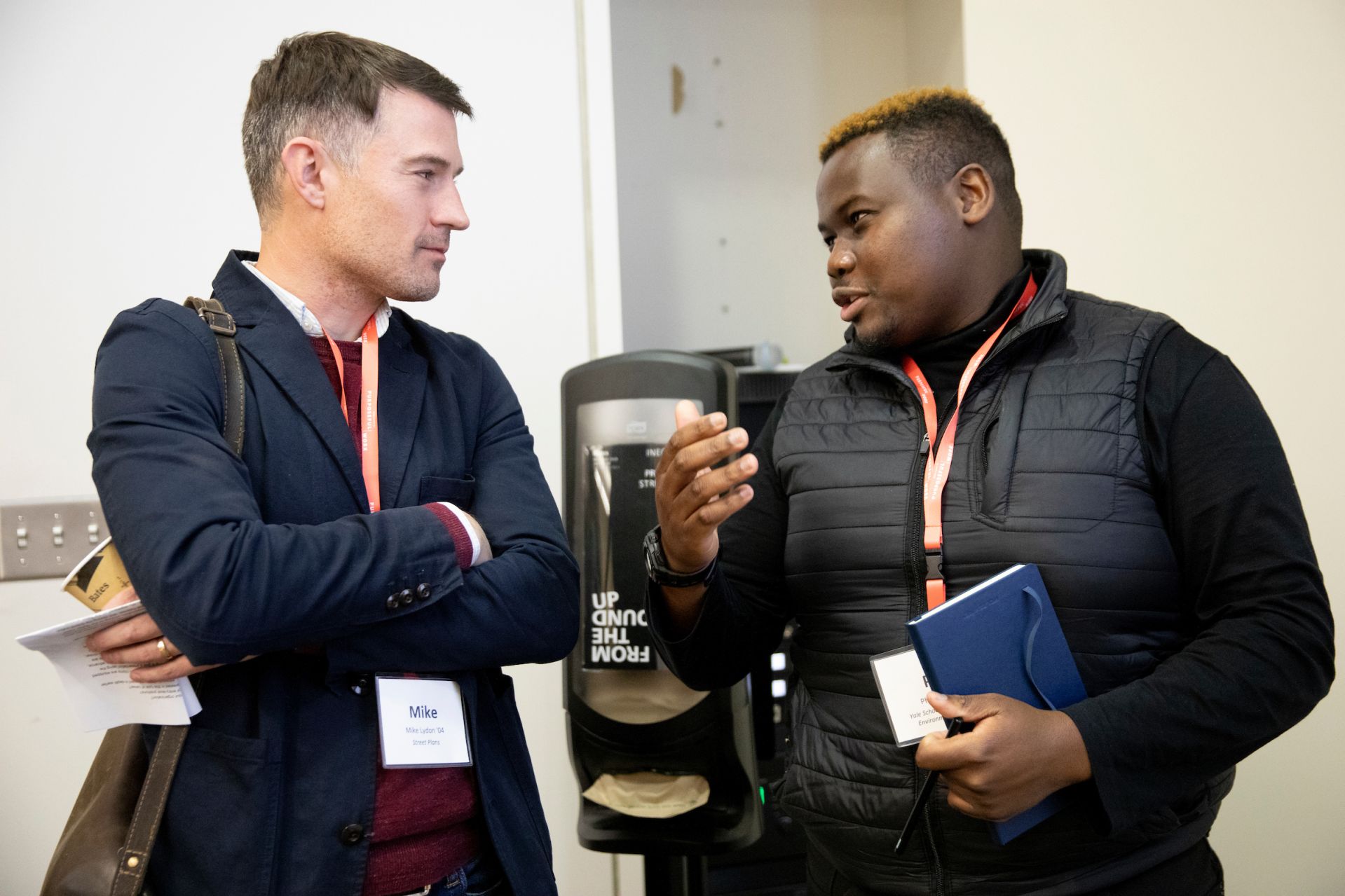
Entrepreneur Mike Lydon ’04 talks with Phil Dube ’16 at a January gathering of alumni in environmental careers. (Phyllis Graber Jensen/Bates College)
Moreover, if climate change becomes a priority to the U.S. government, this could drastically change the job opportunities in the field. “The government hires a lot of consulting firms,” said Dube.
Dube also stressed the importance of staying up to date on the news and continuing having conversations with those who are already working in the field to be more aware of emerging issues.
Explore
Part of the beauty of the liberal arts degree is that you have the opportunity to take classes outside of your major. Take advantage of that, the panelists advised. If you’re a biology major, don’t be embarrassed to take a class in art history, music, econ or Latin American studies. You’ll be surprised just when your diverse expertise might come in handy.
Hannah Broadley ‘10, who studies invasive insects as a postdoctoral researcher at the University of Massachusetts Amherst, said she makes the most of her liberal arts degree on a daily basis.
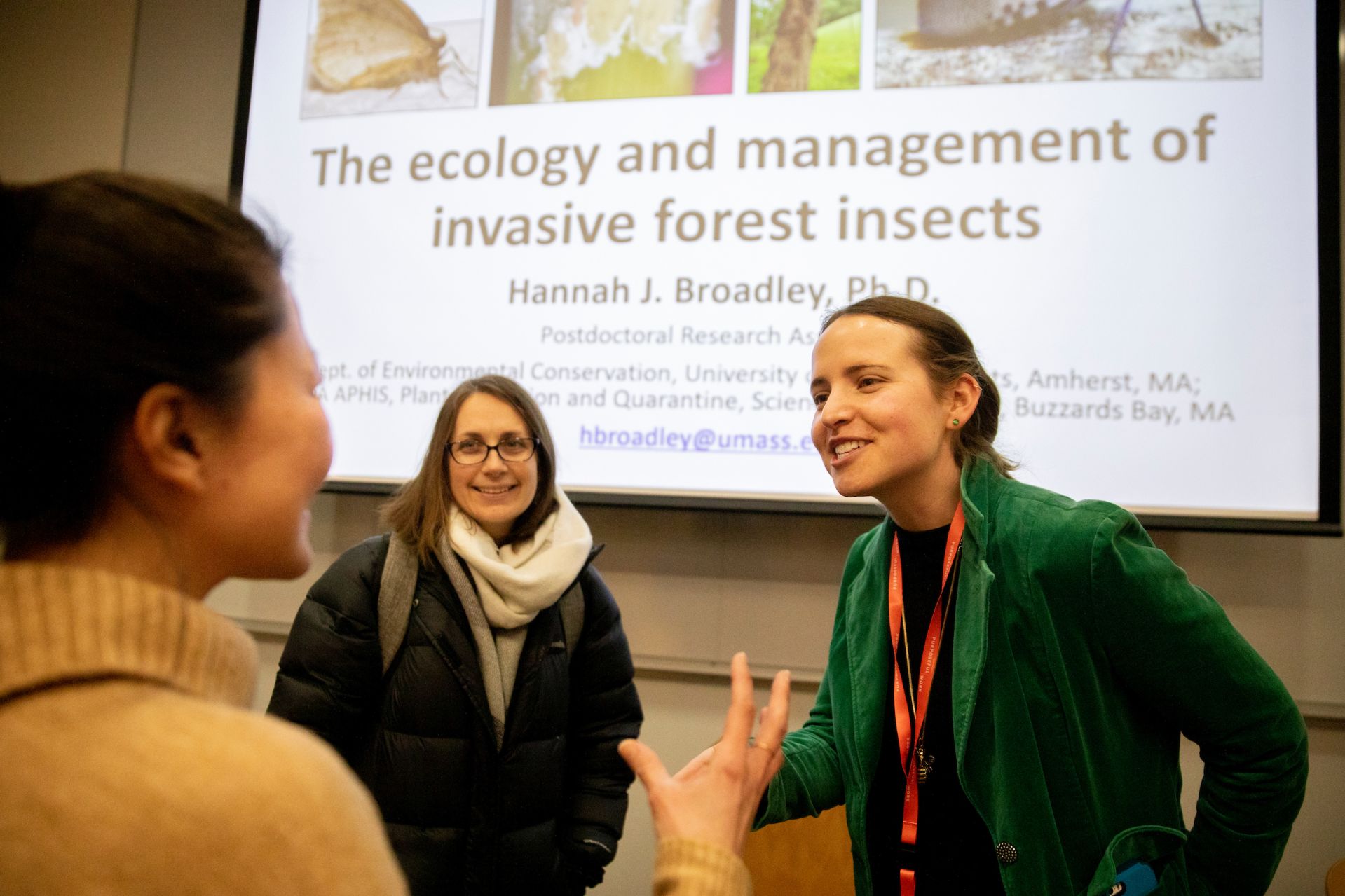
Postdoctoral researcher Hannah Broadley ’10 greets students at a January gathering of Bates alumni in environmental fields. (Phyllis Graber Jensen/Bates College)
“I’m using my background in Asian studies to be a better collaborator to my colleagues in Japan and China and Korea,” she said. “I’m using my art classes to present my tables and my graphs in a much better way.”
Having diverse interests and experience can make you stand out over other career candidates as well as help you form connections about the role of environmentalism across different fields.
All in all, the candidates agreed that Bates prepared them well for the work they do now, and not just academically. “Use Bates as a resource, but go beyond that too,” said Conover.
